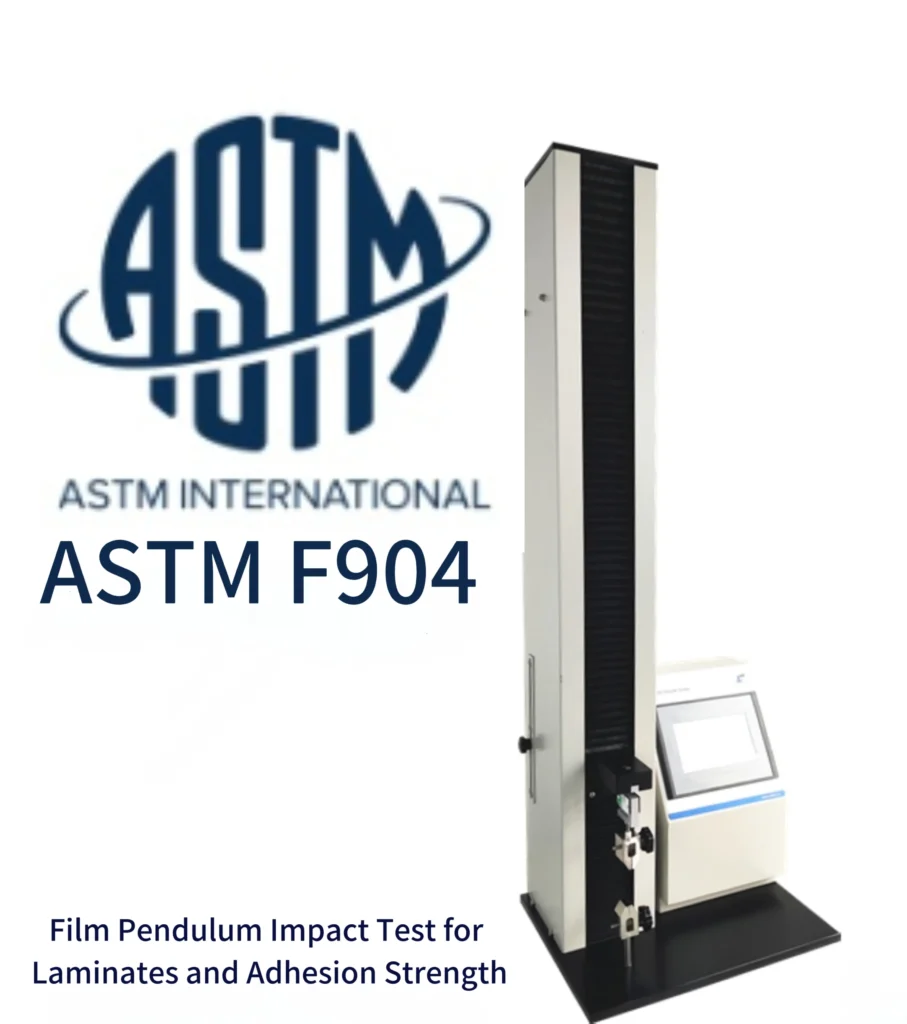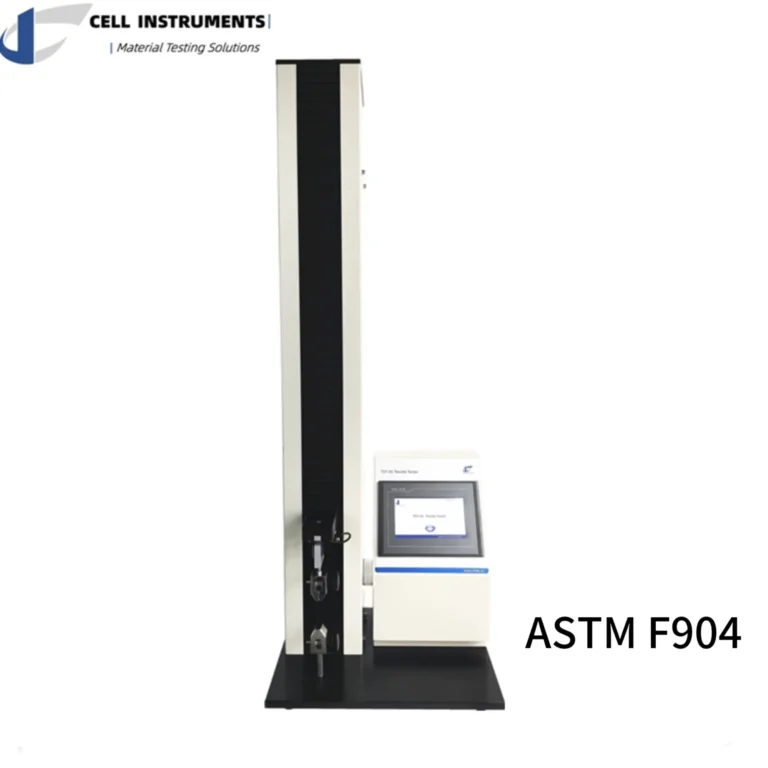
ASTM F904
Laminates and Adhesion Strength Test
For industries like packaging, medical devices, and flexible barrier materials, ensuring strong adhesion between laminate layers is crucial to product integrity and performance. ASTM F904 is a widely accepted test method used to evaluate the bond strength and ply adhesion of flexible laminates, helping manufacturers maintain quality and reliability. In this article, we’ll explore how this standard works, its testing procedures, and how it connects to key material properties like film tensile strength, tensile testing of plastic films, and puncture resistance—all of which play a critical role in assessing the durability of laminated materials.
Importance of Bond Strength and Adhesion in Flexible Laminates
Laminates, made by joining layers of materials like plastic films, foil, paper, or cellulose, are essential in the world of flexible packaging. The strength of the bond between these layers directly impacts how well the package performs. If the adhesion is weak, it can result in delamination, which undermines both the protective barrier and the overall reliability of the packaging.
The ASTM F904 test method offers a practical approach for evaluating this bond strength. By measuring the force needed to separate the layers with a tensile testing machine, manufacturers can assess whether the lamination process meets performance requirements and make meaningful comparisons between similar materials.
What Is ASTM F904?
These environmental factors can significantly influence the performance of flexible barrier materials, especially in demanding applications such as food packaging, medical devices, and pharmaceutical laminates. For instance, high humidity or exposure to boiling water can soften certain layers, while low temperatures might cause brittleness—both of which can affect the bond strength between plies. Similarly, contact with fats, oils, or sterilizing agents may degrade the adhesive layer over time.
By using ASTM F904, manufacturers can simulate these real-world conditions and observe how different materials and bonding methods hold up under stress. The results help in identifying potential failure points and in choosing the right combination of substrates and adhesives for a given application.
Moreover, when integrated with other performance tests—such as film tensile strength and puncture resistance testing—this method offers a more complete picture of laminate durability. Together, these tests support better decision-making in product development, quality control, and regulatory compliance.
For precise and consistent measurements during ASTM F904 testing, a high-performance instrument like the TST-01 Tensile Tester from Cell Instruments is recommended. With advanced features such as programmable speed control, real-time curve display, and multi-fixture compatibility, it’s ideally suited for bond strength, peel, and tensile testing of plastic films.
Key Test Parameters and Procedure Overview
To perform an ASTM F904 test:
-
Specimen Preparation: Cut specimens to standard dimensions (e.g., 25.4 mm × 250 mm). Initiate ply separation using mechanical or chemical methods.
-
Machine Setup: Use a precision tensile testing machine like the TST-01 Tensile Tester from Cell Instruments, which ensures accurate and consistent test control.
-
Testing: Clamp separated layers and apply tensile force at a standard speed (typically 280 mm/min) to measure the force needed to peel the layers apart.
-
Data Analysis: Report includes average force, failure type (adhesive or cohesive), and statistical values such as standard deviation.
This test can also be extended to assess film puncture resistance testing when evaluating multi-layer film systems for their mechanical robustness.
Relationship with Tensile Properties and Other Film Tests
The ASTM F904 test, while focused on adhesion, connects closely with other key performance parameters:
-
Tensile strength: Indicates a film’s resistance to pulling forces and is measured via ASTM D882. Understanding tensile strength of plastic film provides baseline mechanical performance.
-
Film tensile strength is crucial when determining how the overall laminate will behave under stress or load-bearing conditions.
-
Tensile test for plastic films is often used in conjunction with adhesion tests to ensure the laminate performs as a unified structure.
-
Film puncture resistance testing complements adhesion testing by evaluating how well a film can withstand puncture or penetration, especially important for medical or food packaging.
Equipment Spotlight: TST-01 Tensile Tester

To ensure accurate and repeatable results during ASTM F904 testing, selecting a reliable testing machine is critical.
The TST-01 Tensile Tester from Cell Instruments is designed for high-precision testing of films and laminates. Its key features include:
-
7” HMI with real-time data visualization
-
Precision screw-driven mechanics for stable speed control
-
Wide speed range (1–500 mm/min) for versatile testing
-
Compatibility with multiple test fixtures: tensile, peel, puncture, and more
-
Built-in standard programs for bond strength, seal strength, 180° peel, etc.
For professionals conducting adhesion and bond strength testing in flexible barrier materials, the TST-01 offers unmatched flexibility and performance.
Applications Across Industries
ASTM F904 and related laminate adhesion tests are essential across multiple sectors:
-
Pharmaceutical: Ensuring blister packs and infusion bags resist delamination
-
Food packaging: Guaranteeing seals hold under boiling, freezing, or greasy conditions
-
Medical: Maintaining sterile barriers in medical device pouches
-
Textiles and adhesives: Evaluating coating and bonding performance
Reliable testing leads to higher product quality, reduced failure rates, and compliance with regulatory expectations.
Conclusion
Understanding ASTM F904 is essential for manufacturers and quality assurance teams working with laminates, adhesion, and flexible barrier materials. By leveraging comprehensive testing, such as tensile strength, film tensile strength, and film puncture resistance testing, businesses can ensure product integrity from production to end use.
Choosing the right instrument like the TST-01 Tensile Tester further enhances testing reliability, efficiency, and confidence in results.
For more information on how to implement ASTM F904 testing or to learn more about advanced material testing solutions, contact Cell Instruments today.
